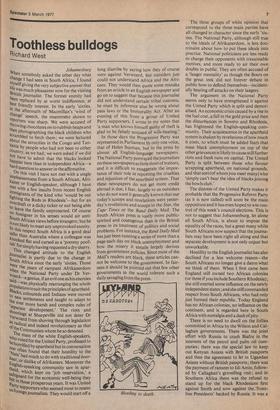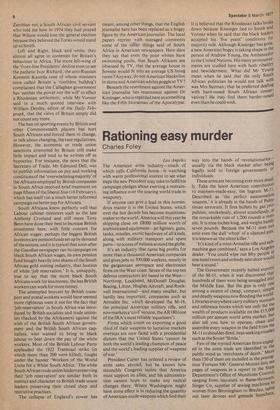Toothless bulldogs
Richard West
Johannesburg When somebody asked the other day what Change I had seen in South Africa, I found tn. yself giving the very subjective answer that life was much pleasanter now for the visiting British journalist. The former enmity had been replaced by at worst indifference, at beSt friendly interest. In the early 'sixties, in the aftermath of Macmillan's 'wind of Change' speech, the resentment shown to reporters was sharp. We were accused of throwing chocolates on to rubbish heaps and then photographing the black children who scrambled to fetch them; we were lectured about the atrocities in the Congo and Tanzania by people who had not been to either e°1IntrY, as we had ; we were asked if we did not have to admit that the blacks looked happier here than in independent Africa—a hard question to answer in the affirmative. On this visit I have not met with a single unpleasantness from a South African, Afrikaner or English-speaker, although I have ft let with a few insults from recent English 1,Innligrants of the kind who 'would be out fighting the Reds in Rhodesia'—but for an overdraft or a dicky ticker or not being able to leave the family unprotected. Of course no foreigner in his senses would air antiSouth African views before strangers; but he IS not likely to meet any unprovoked enmity. o this respect South Africa is a good deal safer than Australia where a colleague was knocked flat and cursed as a `pommy pooftah for simply having requested a dry sherry. . Tilts changed attitude to the English Journalist is partly due to the change in South Africa since the early 'sixties. Those were the years of rampant Afrikanerdom When the National Party under Dr Verwo.erd—a genius, if an evil one as his enemies said—was physically rearranging the whole PoPulationto suit theprinciples of apartheid. Blacks, coloureds and Indians were moved to new settlements and taught to adapt to the ever more harsh and complex rules of separate development.' The riots and Shootings at Sharpeville did not deter Dr v erwoerd from shoving through legislation as,. radical and indeed revolutionary as that of the Communists whom he so detested. The mass of the white English-speakers, who voted for the United Party, professed to be horrified by apartheid but in conversation ,,°0e often found that their hostility to the had much to do with traditional boern,aat,or dislike of Afrikaners. Moreover the ..rtOsh-speaking community saw in apartheid, which kept on `job reservation, a 8,saleguard for the economic well-being they felt to those prosperous years. It was United party suPporters who seemed most to resent us foreign journalists. They would start off a long diatribe by saying how they of course were against Verwoerd, but outsiders just could not understand Africa and the Africans. They would then quote some mistake from an article in an English newspaper and go on to suggest that because this journalist did not understand certain tribal customs, he must by inference also be wrong about pass laws or the Immorality Act. After an evening of this from a group of United Party supporters, I wrote in my notes that `a man who knows himself guilty of theft is glad to be falsely accused of wife-beating.'
In those days the Progressive Party was represented in Parliament by only one voice, that of Helen Suzman, but in the press by almost all English-language newspapers The National Party portrayed the journalists on these newspapers as little short of traitors, and it is difficult to exaggerate the importance of their role in reporting the cruelties and injustices of the apartheid system. That these newspapers do not get more credit abroad is due, I fear, largely to us outsiders who do not want it generally known that our today's scoops and revelations were yesterday's revelations and scoops in the Star, the rape Times or the Rand Daily Mail. The South African press is vastly more publicspirited and courageous than is the British press in its treatment of politics and social problems. For instance, the Rand Daily Mail has just been running a series of more than a page each day on black unemployment and how the misery it entails largely derives from government policies. Since most of the Mail's readers are black, these articles cannot be welcome to the government. In fairness it should be pointed out that few other governments in the world tolerate such a daily savaging from the press.
The three groups of white opinion that correspond to the three main parties have all changed in character since the early 'six ties. The National Party, although still true to the ideals of Afrikanerdom, is less doc trinaire about how to put these ideals into practice. National politicians are less ready to charge their opponents with treasonable motives, and more ready to air their own doubts in public. They are often accused of a laager mentality' as though the Boers on the great trek did not forever debate in public how to defend themselves—incidentally beating off attacks on their laagers.
The argument in the National Party seems only to have strengthened it against the United Party which is split and demoralised. An economic crisis caused by a rise in the fuel cost, a fall in the gold price and then the disturbances in Soweto and Rhodesia, has frightened the English-speaking community. Their acquiescence in the apartheid system is shaken by revelations of how much it costs, to which must be added fears that mass black unemployment on top of the other grievances is likely to cause still further riots and fresh runs on capital. The United Party is split between those who favour scrapping apartheid, on national grounds, and that sort (of whom you meet many) who 'simply can't bear the idea of blacks joining the bowls club.'
The distress of the United Party makes it probable that the Progressive Reform Party (as it is now called) will soon be the main opposition and it has even hoped to win control of this week's council elections. This is not to suggest that Johannesburg, let alone all South Africa, is about to impose the equality of the races, but a great many white South Africans now suspect that the journalists may have been right all along and that separate development is not only unjust but unworkable.
Hostility to the English journalist has also declined for a less welcome reason—the South Africans no longer give a damn what we think of them. When I first came here England still owned two African colonies (or three if you include Southern Rhodesia); she still exerted some influence on the newly independent states; and she still commanded respect from South Africans, who had only just formed their republic. Today England has no African colonies, no influence on the continent, and is regarded here in South Africa with nostalgia and a dash of pity.
There is no need to dwell on the follies committed in Africa by the Wilson and Callaghan governments. There was the joint effort with Russia to crush Biafra in the interests of the petrol and palm oil companies; there was the special law to keep out Kenyan Asians with British passports and then the agreement to let in Ugandan Asians without British passports; there was the payment of ransom to Idi Amin, followed by Callaghan's grovelling visit; and in Southern Africa there was the refusal to stand up for the black Rhodesians first against Smith and now against the.`frontline Presidents' backed by Russia. It was a Zambian not a South African civil servant who told me how in 1974 they had prayed that Wilson would lose the general election because they believed the Tories would stand up to Smith.
Left and Right, black and white, they almost all agree in contempt for Britain's behaviour in Africa. The more left-wing of the 'front-line Presidents' decline even to see the pathetic Ivor Richard; the anti-Russian Kenneth Kaunda (one of whose ministers once called Britain a 'toothless bulldog') complained that the Callaghan government has 'neither the power nor the will' to effect a Rhodesian settlement; while Mr Vorster said in a much quoted interview with William Deedes, editor of the Daily Telegraph, that the views of Britain simply did not count any more.
The ban on sporting events by British and other Commonwealth players has hurt South Africans and forced them to change, or talk about changing, the race regulations. However, the economic or trade union sanctions attempted by Britain still -make little impact and tend to be written off as hypocrisy. For instance, the news that the Secretary of Trade, Mr Edmund Dell, was to publish information on pay and working conditions of the 'overwhelming majority' of the Africans employed by British companies in South Africa received brief treatment on page fifteen of the liberal Star (16 February), which has itself run a much better informed campaign on better pay for Africans.
South Africans know perfectly well that Labour cabinet ministers such as the late Anthony Crosland and still more Tony Benn have done their best to increase British investment here, with little concern for African wages: perhaps the biggest British investors are pension funds set up by demand of the unions, and it is typical that soon after the Guardian newspaper ran its campaign on black South African wages, its own pension fund bought heavily into shares of the South African gold mining industry, that bastion of white 'job reservation.' It is, unhappily, true to say that the more black South Africans work for less money, the less British workers can work for more money.
The attempted boycott by British transport and postal workers would have seemed more righteous were it not for the fact that 'job reservation' in South Africa was introduced by British socialists and trade unionists (backed by the Afrikaners) against the wish of the British South African government and the British South African capitalists, who wanted to bring in black labour to beat down the pay of the white workers. Most of the British Labour Party applauded the 1922 Transvaal strike (in which more than 200 were killed), fought under the banner 'Workers of the World Unite for a White South Africa.' The white South African trade union leaders preserving their `job reservation' are similar both in instinct and character to British trade union leaders preserving their closed shop and restrictive practices.
The collapse of England's power has meant, among other things, that the English journalist here has been replaced as a bogey figure by the American journalist. The local papers reprint with outraged comments some of the sillier things said of South Africa in American newspapers. How dare they say that even the poor whites have swimming pools, that South Africans are obsessed by TV, that the average house in Soweto would fit into an average US living room ? Anyway, do not American blacks live in slums and American whites goggle at TV?
Beneath the resentment against the American journalist lies resentment against Dr Kissinger, who is regarded here as something like the Fifth Horseman of the Apocalypse.
It is believed that the Rhodesian talks broke down because Kissinger lied to Smith and Vorster when he said that the black leaders accepted his 'five point' conditions for majority rule. Although Kissinger has gone, a new American bogey is taking shape in the person of Andrew Young, the Ambassador to the United Nations. His many pronouncements are studied here with both ribaldry and bewilderment. What did Mr young mean when he said that the only South African politician . he would not talk with was Mrs Suzman; that he preferred dealing with hard-nosed South African conser-vatives ? He may find them harder-nosed even than he could wish.



































 Previous page
Previous page